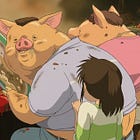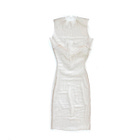You're shaped by what you pay attention to
What you look at is what you worship, what you worship is what you become.
We have whites in our eyes because we care about what other people are looking at. The most universal symbol is the arrow (→) because of how primitive it is: the spear precedes words, alphabets, and compasses. It’s a line with a tip at one end, and it’s enough to imply “LOOK”. Its shape embodies its function—to point, to pierce, to direct. Every road sign, every cursor on a screen, every gesture of a finger uses this prehistoric grammar of attention. To point at something is to make it matter.
Attention is a vector: there is always a direction to its magnitude. To attend is to stretch toward (Latine, attendere), like a limb straining or bending to reach something. That’s why attention is measured in payments: it’s costly to pay attention because to reach toward one thing is to withdraw from others. We call it the attention economy because it, too, abides by the law of scarcity. Attention moves like a liquid, flowing from one thing to another like a pile of magnetic dust coagulating around a pole.
You are an appetite.
What is a person? A person is an appetite.
When you strip away all your thin desires you find yourself a body of directional hunger. You are a mimicry machine, waiting for the next thing to imitate. You are an appetite, waiting for the next thing to want. Attention is like metabolism: you become what you gaze at. Just like your body digests food and turns it into cells and tissues, your attention digests the things you focus on and turns them into thoughts, habits, and eventually, a way of being.
For where your treasure is, there also is your heart.
—Matthew 6:21
If you constantly feed yourself gossip, you become suspicious. If you feed yourself beauty, you grow more sensitive to it. Attention is the mouth of being, and what you choose to focus on forms the diet of your becoming. It’s not a coincidence that taste is the only bodily sense that has been adapted to mean preferences: the way your attention forms predilections imitates how your tongue has a liking for certain flavors.
What seizes your imagination will change everything.
—Fr. Pedro Arrupe
Everyone is religious.
My grandmother is a scrupulous woman. She’d repeat the things she finds important until she made sure you wouldn’t forget, and she’d pick up crumbs no one else could detect on the dinner table. She isn’t religious in the traditional sense; she’s not part of an organized religion, she doesn’t follow the principles of a denomination, she doesn’t believe in spirits. But, she’s religious in the way that her days form an ongoing ritual of demonstrating her values, and it shows in her cooking, sewing, and dancing. How she does one thing is how she does everything. Like how some people claim to be spiritual but not religious, I think my grandmother is religious but not spiritual.
The word religion comes from Latin relegere, which means to “go over again”, to “carefully observe”. Religion, in its purest sense, is not about dogma, rites, monasticism, or indoctrination; it’s about attention.
It’s why the verb that precedes religion is practice. Religion, like the violin or dentistry, is a practice because it isn’t a one-time declaration, but a repeated discipline of paying attention. The Latin practicus means “concerned with action.” To practice religion is to return, again and again, to the same gestures, words, and rituals until they shape you. Belief on its own is abstract; practice is belief made flesh through repetition.
Like a musical instrument, a sport, or a profession, anything that’s practiced is directional. Are you getting better at or closer to something? Marcel Proust once said, “The real voyage of discovery consists not in seeing new sights, but in looking with new eyes,” likewise, what you practice shapes the way you look at things. This is why the placebo effect works, because while it doesn’t change any material thing, it changes the shape of your attention, which is the fabric of perception. The placebo effect is your belief made tangible.
It all begins with an eyeball and an arrow: to look at something—to focus—is the unit of measurement for reality. You transform in the direction of your greatest focus. What you work on is also working on you.
Our anxiety-burnout crisis is not directly caused by excess, but distraction. We are spiritually malnourished from fast content. Our mistake is thinking that being informed is the same as being smart, or being alive, or being, entirely. So, practicing relegere is not actually about “being a better person”. The point of exercising focus is not perfection, what matters is the daily return and the refusal to let attention scatter. The point isn’t to dissociate or detach yourself from desires—it’s the opposite. It’s to attach yourself to a goal so firmly that distractions no longer matter. It’s to care about one thing so adamantly that noise is no longer distracting. Focus is the crucible of becoming.
Focus is the effort against spiritual collapse. It’s how we become more than we are, reaching through the cracks of the material world for the infinite beyond the ordinary. The fact that we are bipedal, that we operate in the vertical axis, means that we’re the only species that seeks transcendence and not just comparison. We work not just for survival but for culture, beauty, and connection. Sometimes, we even make sacrifices, working against survival for the sake of those things. We’re the only beings with a need for meaning beyond information, for revelation beyond stimulation, for truth beyond news.
We’re not here to look left and right, we’re here to look up.
~~~
If you enjoyed this, you’d LOVE these:
And, “What Should Remain Hidden?”, written for Inkwell Magazine.









“Focus is the effort against spiritual collapse” - SO good. Thank you so much for this, already know I’ll be returning to it again to take notes!
"Attention, on the other hand, just is life: your experience of being alive consists of nothing other than the sum of everything to which you pay attention." - Oliver Burkeman